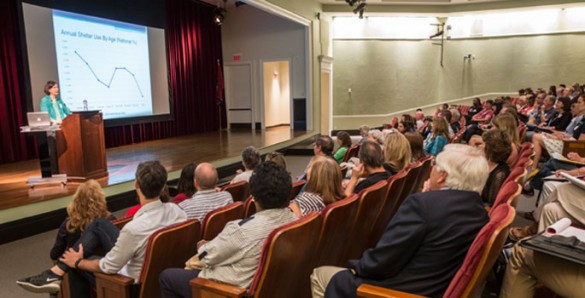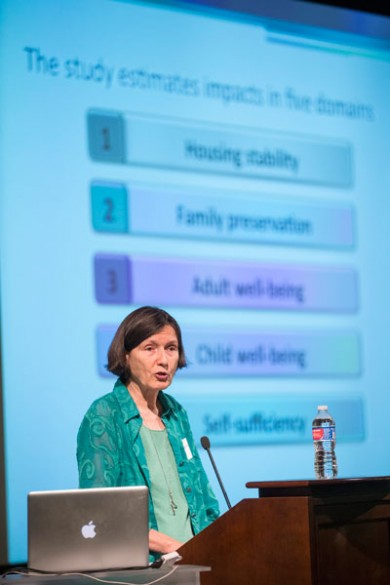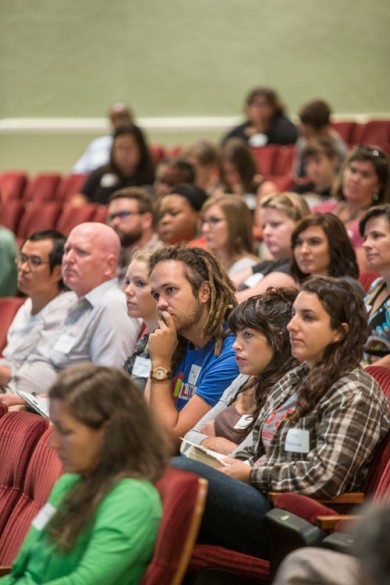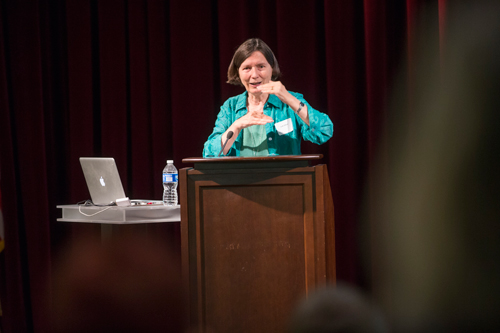Rapid rehousing isn’t working, HUD/Vanderbilt research says

A landmark research study on assistance programs for homeless families was the focus of a discussion which drew a crowd of more than 100 to the Nashville Public Library’s main branch downtown on Aug. 21.
Marybeth Shinn, professor and chair of the Department of Human and Organizational Development at Vanderbilt’s Peabody College of education and human development was co-lead investigator of the Family Options Study—the first large-scale analysis of its kind—commissioned by the U.S. Department of Housing and Urban Development.

The presentation was designed to spur discussion among the stakeholders in Nashville’s housing services community.
“As citizens of a city with a concern for homelessness—and a looming problem with housing—we wanted to share these findings with Nashville,” said Camilla Benbow, Rodes and Patricia Hart Dean of Education and Human Development. “One of Peabody’s most important roles is to disseminate knowledge that’s relevant to decision-makers and stakeholders. We want to improve understanding and elevate the dialogue in our community.”
The Family Options Study included the collection of data from more than 2,000 families experiencing homelessness in a dozen communities across the country over an 18-month period.
In partnership with Abt Associates, Shinn evaluated the effectiveness of multiple housing program options, including rapid rehousing, community-based transitional housing, Permanent subsidized housing, shelter and “usual care” (a combination of services families attain on their own).
Shinn shared some surprising results from the study, including data that showed the Obama Administration’s $1.5 billion rapid rehousing program is not keeping families out of shelter for the long haul.

Rapid rehousing is a relatively inexpensive program that moves families out of shelter quickly. But Shinn observed that the families placed ultimately couldn’t keep up with rental costs, and wound up back in shelter after a few months.
Permanent subsidized housing (housing vouchers) are slightly more costly than rapid rehousing, but were found to be significantly more effective in stabilizing families’ housing situation long term.
“The study suggests the vouchers were the clear winner among interventions for families experiencing homelessness, and more broadly, it points to the importance of affordable housing for people with extremely low incomes,” Shinn said. The vouchers also had “radiating positive affects” on the families, Shinn said.
“With the vouchers, fewer children were separated from families and placed in foster care,” she said. “Problems such as substance use, intimate partner violence and psychological distress were reduced. Children had fewer school moves and were absent less, and families were more food secure.”
The complete study results were presented last month at the HUD headquarters in Washington, D.C.
Watch the July 8 briefing on HUD’s YouTube channel.
Attendees at the Nashville event included key stakeholders in the local housing services community, who participated in a robust Q&A session following Shinn’s presentation.

The Q&A drilled down to how the national study results could be applied to Nashville. Areas of concern included area landlords’ unwillingness to accept vouchers, families being uprooted when building owners sell, and the loss of affordable housing options due to gentrification and rapid growth.
Presentations also were made by Will Connelly of the Metro Homelessness Commission, Jennifer Reason of Safe Haven and Matt Preston of Catholic Charities. Attendees later broke up into groups to continue the discussion.
Each year, it’s estimated that more than 150,000 American families experience homelessness and are forced to seek emergency shelter for themselves and their children.
The Nashville gathering was sponsored by the Vanderbilt Center for Nashville Studies, the Nashville Public Library and Peabody College.
The Family Options Study, which continues for three more years, was supported by the Eunice Kennedy Shriver National Institute of Child Health and Human Development of the National Institutes of Health, under Award Number R01HD066082.